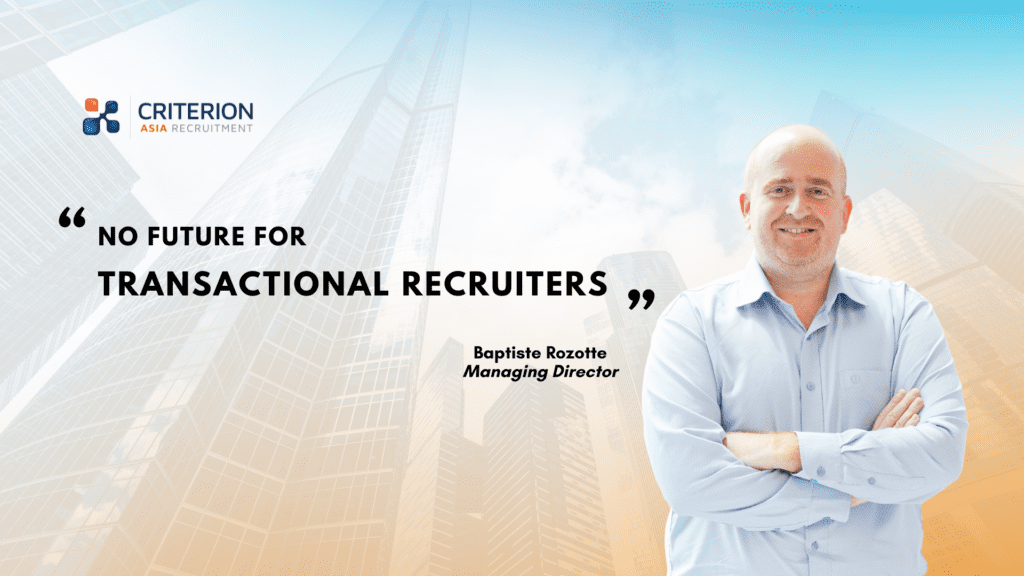
Recruitment is often seen as a transactional industry, where the primary goal is to match candidates with job openings as efficiently as possible. Many recruiters focus on metrics like the number of placements made or the speed at which they can fill positions (turnaround time/time to fill). While these metrics are essential for measuring success, they often underestimate the importance of building meaningful relationships with both clients and candidates.
In a world where technology and automation are rapidly changing the recruitment industry it’s more critical than ever for recruiters to stand out by prioritizing relationships over transactions.
The Transactional Nature of Recruitment
Recruitment has changed significantly over the past 10 years, with advances in technology making it easier to source, screen, and place candidates quickly. As a result, 90% of recruiters have become more transactional in their approach, focusing on the immediate needs of their clients and candidates rather than building long-term relationships.
Transactional recruiters are often driven by short-term goals, such as hitting monthly KPIs or maximizing their commission. They prioritize speed and efficiency, which can sometimes lead to a lack of personalization and a disconnect between the recruiter and the people they are working with.
No Future for transactional recruiters
Here are the main challenges faced by transactional recruiters:
1. Limited Candidate Loyalty: When candidates feel like they are treated as commodities rather than individuals, they are less likely to remain loyal to a recruiter or recruitment agency. This can result in candidates seeking opportunities elsewhere and a loss of potential future placements.
2. Low Client Relationships: Clients who perceive recruiters as purely transactional may view them as interchangeable and not invest in building a lasting partnership. This can lead to clients constantly switching recruitment agencies in search of a better deal.
3. Missed Opportunities: Building strong relationships with candidates and clients can lead to valuable referrals and repeat business. Transactional recruiters may miss out on these opportunities because they are solely focused on the immediate placement.
4. Bad Reputation: Transactional recruiters can develop a negative reputation within the industry and among candidates and clients. This can harm their ability to attract top talent and retain loyal clients.

Why Building Relationships must be the priority.
Relationship-focused recruiters prioritize the long-term value of their interactions with clients and candidates. They understand that maintaining meaningful connections can lead to numerous benefits: Candidate Trust and Loyalty, Client Retention, Improved Candidate Quality and Better Reputation.
Relationship-Focused Recruitment at Criterion Asia Recruitment
Those are the practical strategies that we have implemented at Criterion Asia Recruitment to transition from a transactional approach to a relationship-focused one:
1. Active Listening: We take the time to actively listen to both clients and candidates. We understand their needs, concerns, and aspirations. This not only demonstrates empathy but also allows us to provide more tailored solutions.
2. Regular Check-Ins: We maintain regular communication with our clients and candidates, even when there are no immediate job opportunities.
3. Provide Value: We go beyond the basic responsibilities of a recruiter. We share industry insights, career advice, and helpful resources. We recently launched industry reports to our clients for them to get a better understanding of the trends of the labour market and positions in high demand in the industry.
4. Transparency: We are open and honest in our communication, even when delivering difficult news. Transparency builds trust and credibility, which are essential for nurturing long-term relationships.
5. Networking: We attend industry events and strengthen our relationships with Chambers of Commerce (Especially FTCC and CanCham) to expand our connections. Building a robust professional network can lead to new opportunities and referrals.
7. Offer Long-Term Support: We don’t view our role as complete once a placement is made. We continue to support candidates in their new roles, check in on their progress, and provide guidance as needed.
8. Seek Feedback: We encourage both candidates and clients to provide feedback on their experience working with us. We use this feedback to continually improve our services and relationships. In addition, we have internal workshops at Criterion once a quarter where we find actionable solutions to improve our services and relationship with both candidates and clients.
9. Invest in Training: We invest in training for our consultants. Recruiters who prioritize relationship-building should invest in ongoing training and development.
For Criterion, it’s the human connections that matter most in the world of recruitment.
